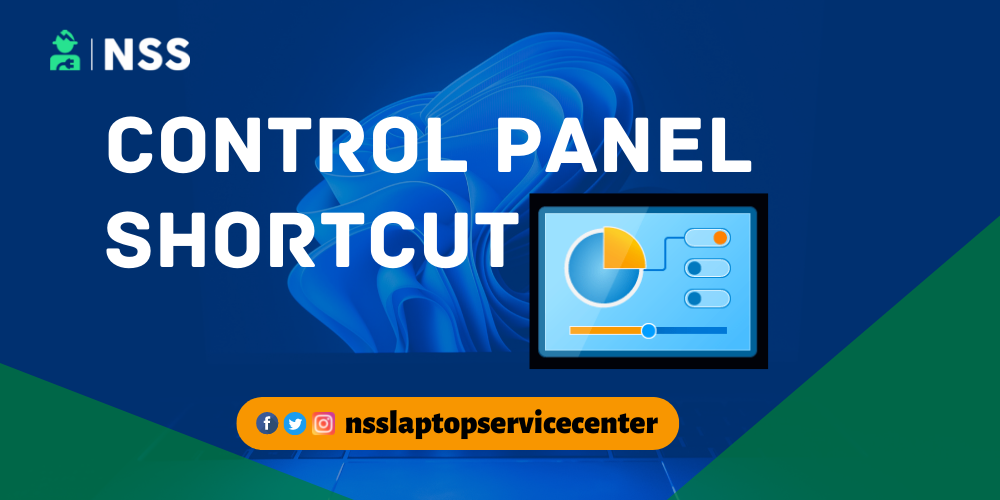
Check How To Configure Windows 11 Control Panel Shortcuts
Microsoft's vision for the future of personal computing has arrived with Windows 11. It's a smoother, more rounded Windows that puts the Start menu in the spotlight while eliminating some critical elements clogging Windows 10. While Windows 11 has several nice improvements, many are so subtle that you won't see them until you look closely. Even noticeable enhancements, like the newly concentrated Home button, disappear into the background quickly.
Table of Contents
How to add a control panel shortcut to the desktop
Many users use shortcuts on their Windows desktops. There are two methods for adding a Control Panel icon to your desktop. One way is to use the desktop icon settings to choose a Control Panel shortcut. You may, however, use the Create Shortcut feature to create a more versatile CP desktop shortcut. You may add a Control Panel icon to the desktop using the Create Shortcut window.
-
Right-click on a blank area on the desktop and choose New and Shortcut from the context menu.
-
Enter %windir% System32 control.exe in the Location text box and press Next to proceed.
-
In the shortcut name text box, type Control Panel.
-
Choose the Finish option.
-
You may launch the Control Panel by clicking your new shortcut on the CP desktop. By default, it will have a Control Panel icon. You may change it by right-clicking the shortcut, choosing Properties, and then clicking the Change icon. Enter %windir% System32 imageres.dll in the Search icons box that appears straight below.
-
You may then select more icons from the system's default selection. To preserve the updated icon settings, click Apply.
Also Read: Windows Shortcut Keys - All Daily Use Shortcut Keys
How to configure a control panel keyboard shortcut
You may assign a keyboard shortcut to a Control Panel shortcut created in the first approach. Then, you'll have a handy keyboard shortcut to launch the Control Panel whenever needed. You may create a CP keyboard shortcut similar to this.
-
To begin, create a Control Panel shortcut on your desktop, as explained first.
-
In the Control Panel, right-click your desktop shortcut to open the Properties context menu.
-
Press the VS key after clicking inside the hotkey box. A keyboard shortcut, Control + Alt + C, is created when you press VS.
-
To register the new keyboard shortcut, click Apply.
-
To close the window, click OK.
-
To access the Control Panel, use the new keyboard shortcut Ctrl + Alt + C.
A keyboard shortcut is handier than a desktop shortcut since you don't need to minimize windows to reach the Control Panel. Do not, however, remove the Control Panel shortcut from the desktop. It is still required for the keyboard shortcut to function.
How to add a Control Panel shortcut to the Start menu and taskbar
Add a shortcut to the Control Panel in the taskbar and Start menu. Using the Pin context menu choices, you may add CP shortcuts to various parts in Windows. Here's how to choose these Control Panel choices.
-
Start the Windows 11 search tool (click the magnifying glass icon on the taskbar to open it).
-
Grab the Control Panel in the Type here to search the text box.
-
In the Control Panel, right-click the search result and select Pin to Taskbar.
-
Select the Dock to Start option to bring the Control Panel to the Start menu.
Winaero Tweaker is a fantastic free Windows customizing software. This software has Many customization options for the desktop, taskbar, file explorer, connection, shortcuts, and context menu. With Winaero Tweaker, you can add a Control Panel shortcut to the Windows 11 desktop context menu, as seen below.
-
Navigate to the Winaero Tweaker download page.
-
To save your ZIP file, click Download Winaero Tweaker.
-
To open the Winaero ZIP file, click on it.
-
On the command bar, click the Extract All button.
-
To select an extraction path, click the Browse button.
-
When finished, tick the box next to the View extracted files option to activate this setting.
-
Choose the Extract option.
-
Double-click the WinAeroTweaker installation file to begin.
-
Then, to install WinAero Tweaker, follow the installation tutorial.
-
Open the Winaero Tweaker window after installing the program.
-
Select Control Panel from the context menu as shown below.
-
Check the box next to Add Control Panel to the desktop context menu.
Check How to Configure Windows 10 Control Panel Shortcuts
I was enraged when Microsoft deleted the Control Panel shortcut from the Windows 10 power user menu (Win + X) in the Creators Update. I used to conduct all of my Windows modifications via the Control Panel, and that was my preferred method of accessing the Control Panel shortcut in Windows 10.
However, after some searching and experimentation, I discovered many methods to reach the Control Panel in Windows 10. Some of these solutions are faster than the power user menu shortcut. So, let's look at the list below.
Use the search fields.
Most search fields in Windows 10, including the Settings search bar, Cortana search, and File Explorer address bar, provide access to the Control Panel shortcut command.
Put Control Panel or Control into any of these search fields, click Enter, and the Control Panel will appear.
Use Run, Command Prompt, or Powershell
Like search fields, the Control Panel may be accessed through the Run dialogue, Command Prompt, or Powershell.
To open the Command Prompt, use Windows + R to open the Run dialogue and type cmd. Similarly, you may open the Control Panel by typing Control on the Command Prompt or Powershell and pressing Enter.
Accessing the Control Panel via Command Prompt or Powershell may appear more work, but it's an excellent alternative to remember if you use these tools regularly.
Through the Start Menu
The Control Panel shortcut is located in the Apps area of the Start Menu. Go to the bottom and click on the "Windows System" folder to find the Control Panel shortcut.
Also Read: Difference Between Memory And Storage
Also Read: Tips To Take Care Of Your Laptop
Conclusion:
I hope you found my post on How to Configure Windows Control Panel Shortcuts helpful. If you answered no, please post any questions about this issue in the contact forum. If you responded yes, please forward this information to your friends and family.
Frequently Asked Questions
Popular Services
- MacBook Battery Replacement Cost
- HP Printer Repair in Delhi NCR
- Dell Laptop Repair
- HP Laptop Repair
- Samsung Laptop Repair
- Lenovo Laptop Repair
- MacBook Repair
- Acer Laptop Repair
- Sony Vaio Laptop Repair
- Microsoft Surface Repair
- Asus Laptop Repair
- MSI Laptop Repair
- Fujitsu Laptop Repair
- Toshiba Laptop Repair
- HP Printer Repair Pune
- Microsoft Surface Battery Replacement
- Microsoft Surface Screen Replacement




